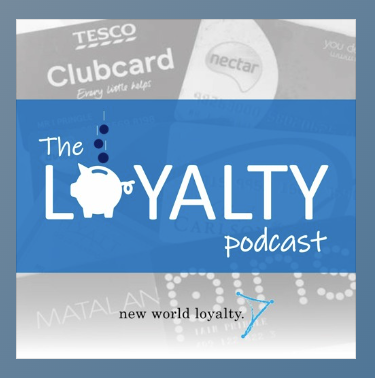When choosing an EPoS system, consider factors like the volume and nature of transactions, integration capabilities and the specific requirements of each outlet.
Host
Iain Pringle, Loyalty Consultant & thought leader, New World Loyalty
Guests
- Phil Lee-Warren, Technical Director, Uniware Systems
- Mark Rooker, Commercial & Campus development Manager, Sheffield Hallam University

Podcast Overview
New World Loyalty regularly create The Loyalty Podcast, and in this episode Iain Pringle explores the issues of rapid change in students behaviour and how loyalty programs need flexibility to adapt to those needs in order to survive.
Phil Lee-Warren, Technical Director, Uniware Systems, was delighted to, be involved in the New World Loyalty podcast. With his 30+ years experience in providing PoS software with loyalty solutions.
Also on the podcast was Mark Rooker, Commercial & Campus development Manager, Sheffield Hallam University. With 10+ years hands on experience of building, operating and managing loyalty programmes for students.
Notes from the podcast
Why is it so difficult?
Students probably evolve quicker than any other type of demographic, since probably about 2009, there has been quite rapid change and then from 2015 onwards completely different student now, it’s chalk and cheese.
International students aren’t changing as much, their habits are similar to 2015/16. It’s the UK students and young people who have really changed. A scheme that will work for an 18 year old now, won’t work in three-year time. So, your business needs to evolve around your students, to be flexible because these students have an accelerated rate of change.
One of the big changes post COVID are social groups, it was common at university to see groups of 5-6 students interacting in social spaces, have a coffee and a sandwich sitting in that environment for a bit with a group. You don’t see that now it’s one or two people if they do go out it’s an experienced dining.
So, what do customers want?
These young audiences want slick and quick process’ as companies such as Amazon, Uber and Just Eat have delivered. They want a quick easy process, that’s key for a young demographic.
Some campus’ are experiencing a high level of deliveries, but what’s surprising is what’s being delivered, not just pizzas, but milkshakes, ice creams, printed work. It’s just constant, everyone could just get anything they want now instantly.
One size does not fit all
Every University is different and what works for one University won’t work for another because their student groups are probably quite different. And this is why it’s really hard to pick an off the shelf product that might help your business.
The loyalty programs that work are the ones that have a really clear understanding of their customers and their issues.
Historically Universities may have had five or six different cards, one for the library, one for access, one for payments, access to gyms. Then came a new system, one card which was preloaded card and there were points and rewards the more they spent. Then came the app solution on a mobile phone, which mirrored the one card system but fell short because students don’t like preloading and getting your money off the card can be a barrier.
What Uniware have done with some university clients is give them a solution with the ability to upload the student population, send the students a joining e-mail. So, the friction of signing up is just basically following a link on an e-mail and ticking a few boxes. Uniware also have a single sign on using Microsoft Azure it’s Federated authentication to smooth the registration process.
For universities who are keen to have a preloading Uniware developed an automated process of refunding the money. When you close your account, there’s an automatic refund back to the card, so it’s very easy to get your money out.
The advantages of using a member scheme
There are commercial advantages to using the member scheme, students in the course of their education are exempt from VAT on a wide variety of foods. So commercially, if you’ve got a system that accurately identifies the customer as a student, you can use the loyalty scheme to offer a 20% discount giving you an advantage over the outlets around you, or giving you an uplift in profit.
Member schemes also have the advantage of being able to offer ‘Club card’ type promotions where you have ‘spot prices’ for only those customers as well as the points scheme in the background.
Data is the key to success
The most important thing is to connect your loyalty programme across all of your channels. So, whether somebody does a click & collect on an app or goes to a self-service kiosk it is all the same loyalty system. The key is being able to identify the customer across all your payment channels, so it has to be flexible.
Uniware are increasingly being asked by our clients to look at anonymous data, if your customer is paying with the same payment card, we’re able to track in the background with something called a payment token. It’s an encrypted token, not the card number, but it’s a token issued by the payment service provider. Joining purchases across different outlets, even if you didn’t use it as a loyalty scheme, its powerful insight for business decisions.
There’s a growing number of other technologies that could allow you to interact with other partners outside of universities. For example, linking to more sustainable suppliers, reuse of plastic cups, companies that are able to give us carbon weighting for carbon per portion size. And you can base rewards on sustainable goals and behaviours.
Rewarding the right, profitable behaviour
In order for a loyalty scheme to work profitably, you have to influence people otherwise you just give loyalty away, give a margin away to your most loyal customers.
Giving your loyalty scheme members their 10th Pizza for free is not necessarily going to drive the right profitable behaviours – are they are highly likely to buy anyway? But, when you use the redemption for a side dish or a something that they don’t normally buy, that’s when you start to see as a change of behaviour and add value to your business.
Sheffield Hallam have been looking at deliveries and exploring a pre-ordering and collection service. Students come on to campus for three to four hours a week, you’re not seeing students in any kind of number stay on campus, so your interactions limited. If you can make the service slick and quick and convenient you could entice more business.
In the ever-evolving landscape of student behavior, flexibility and data-driven insights are key to the success of loyalty programs. Understanding the unique needs of each university and tailoring solutions accordingly is essential for staying relevant and profitable.
With the continuous advancement of technology your EPoS system can be a valuable tool to help you streamline operations and enhance customer experiences.




